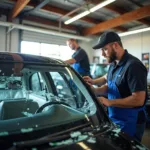If your car has ever been threatened with repossession, you might have wondered about the legality of a repo man breaking a window to access your vehicle. It’s a question many car owners ask, especially when facing financial difficulties. While the answer isn’t always straightforward, understanding your rights and the limitations placed upon repossession agents is crucial.
When Repossession is Legal
Before diving into the specifics of broken windows, it’s important to understand the situations where a repossession agent, sometimes called a recovery agent, is legally allowed to take your car. When you finance a vehicle, you sign a contract with the lender (usually a bank, credit union, or finance company) that outlines the terms of the loan. This contract often includes a clause granting the lender the right to repossess the car if you default on your payments.
Default typically occurs when you miss a specific number of payments, as outlined in your contract. Once you’re in default, the lender can take possession of the car without your permission, often employing a repossession agent to handle the task.
The Rules Around Repossession
Repossession laws vary from state to state, but some common threads exist. In most jurisdictions, repossession agents:
- Can’t breach the peace: This is a broadly defined term, but it generally means they can’t use excessive force, threats, or violence to repossess the vehicle. Breaking a window to gain access is generally considered a breach of the peace.
- Can’t enter your home: A repossession agent typically can’t enter your home or attached garage without your permission or a court order, even if the car is parked inside.
- Can take the car from public property: If your car is parked on a public street, in an open driveway, or in an unsecured lot, it’s typically fair game for repossession.
So, Can They Break a Window?
Given the “breach of the peace” restriction, the answer is generally no. A repossession agent breaking your car window to gain access would likely be considered an excessive use of force and a violation of the law. This is particularly true if the car is parked on private property, such as your driveway or a closed garage.
However, there are exceptions. For instance, if your car is parked in a public parking garage with signage clearly stating that vehicles are subject to repossession, the rules might be different.
What to Do if Your Car Window is Broken
If you discover a repossession agent has broken your car window:
- Document the damage: Take photos and videos of the broken window and any other damage to your car.
- Contact the lender: Inform them about the situation and express your concern about the agent’s actions.
- File a police report: This creates a record of the incident and can be helpful for insurance claims or legal action.
- Consult an attorney: If you believe your rights were violated, an attorney specializing in consumer law can advise you on the best course of action.
Protecting Your Rights
 Car Parked in Garage
Car Parked in Garage
The best way to protect yourself from potential issues during a repossession is to:
- Communicate with your lender: If you’re facing financial hardship and struggling to make your car payments, reach out to your lender immediately. They may be willing to work with you to modify your loan terms or explore alternative solutions.
- Know your state’s laws: Familiarize yourself with your state’s specific laws regarding repossession to understand your rights and the limitations placed upon repossession agents.
- Secure your vehicle: Parking your car in a secured location, such as a closed garage, can make it more difficult for a repossession agent to take the vehicle.
Seeking Help and Resources
Remember, facing car repossession can be stressful, but understanding your rights and seeking professional guidance can make a significant difference. Several resources are available to help you navigate this challenging situation:
- Legal Aid Societies: These organizations provide free or low-cost legal assistance to low-income individuals.
- Consumer Protection Agencies: These agencies offer information and resources to help consumers understand their rights and resolve disputes.
- Financial Counseling Services: Non-profit organizations offer guidance on budgeting, debt management, and credit counseling.
emergency car window repair leeds
By knowing your rights and taking proactive steps, you can better protect yourself and your vehicle during a difficult financial period.


